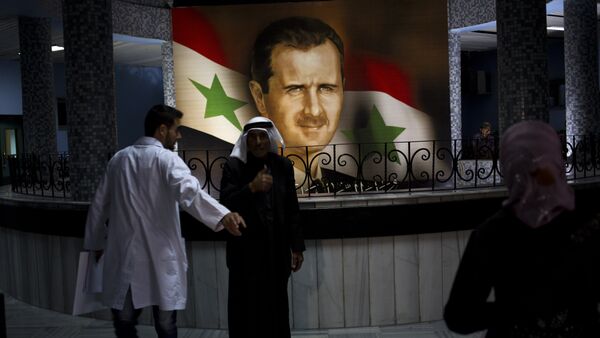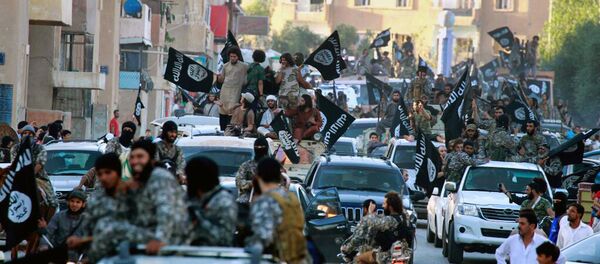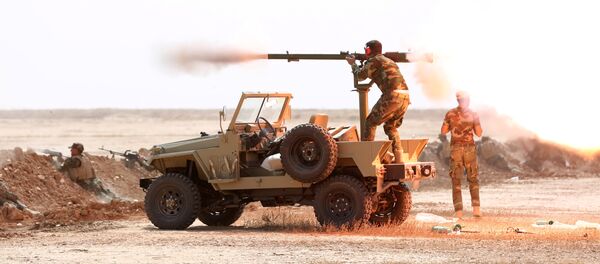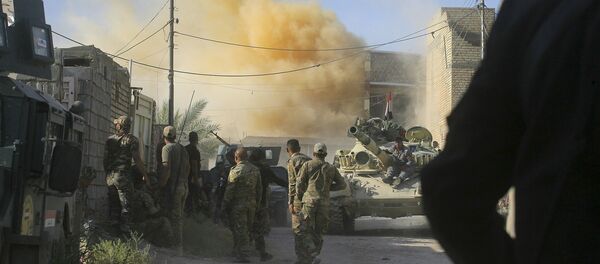"Although the US military estimates that there are only between 3,000 and 4,500 Islamic State [Daesh] fighters in Mosul, compared with tens of thousands of members of the coalition forces-and that excludes the advantage of US airpower-the defenders enjoy the considerable advantages of their position within the city itself," Byman underscores.
The US scholar explains that Iraqi Kurds are "spearheading the initial attacks" liberating the villages east of Mosul, while Sunni tribesman, Iraqi army forces and Shiite militias are also taking a part in the offensive.
"This unsavory mix is much of the problem," Byman notes, adding that "as the Islamic State [Daesh] threat recedes, Iraqi factions will continue their struggle over who gets what."
"Islamic State will seek to take advantage of these problems… Gains might be reversed or at least undermined, and the Islamic State is likely to try to step up international terrorism as its territory recedes," the US scholar points out predicting that the liberation of Mosul won't bring Daesh's terrorist activity to an end.
However, there is more to this problem than meets the eye.
"In other words, if Mosul falls, the entire IS 'caliphate army' could be directed against the Assad government and its allies, a scenario which is likely to cause some satisfaction in Washington," Sheikh suggested.
The analyst argues that the scenario "has a real precedent": when the Iraqi city of Fallujah was retaken by the Iraqi army many Daesh fighters fled to Syria and got re-engaged against the Syrian army.
Back on October 13 Said Mamuzini, a representative of the Kurdistan Democratic Party (KDP), one of the main Kurdish parties in Iraqi Kurdistan, told Sputnik Turkey that "during the [Mosul] operation a corridor will be left for terrorists to escape to Syria."
"Those retreating this way will not be captured," Mamuzini remarked.
On the same day an unnamed source in Moscow's diplomatic and military circles told RIA Novosti that "American and Saudi intelligence services have reached an agreement to provide all militants a safe passage to leave the city."
"More than 9,000 Daesh fighters from Mosul will be redeployed to eastern Syria to carry out a large-scale offensive which will involve among other things taking control over Deir ez-Zor and Palmyra," the source assumed.
On Thursday pan-Arabic television channel Al Mayadeen reported that at least 100 Daesh commanders left Mosul and headed for Syria.
Speaking to RIA Novosti, Hoshawi Babakr, a member of the Kurdistan Democratic Party (KDP), confirmed that the Kurdish militia could allow Daesh fighters to leave Mosul.
"If you look at operations in other cities, there was always some road left to leave fewer casualties, so that the [Iraqi] army and the Peshmerga [Kurdish militia] could gain victory," Babakr noted.
However, this situation spells trouble for the Syrian Arab Army.
"While the Syrian army will be eventually forced into yet another battle, such a situation might also create an excuse for the US, which has largely been out-maneuvered by Russia in Syria, to start a direct military operation in Syria, as a ‘necessary' extension of the battle for Mosul, and thereby confront Syrian and Russian forces more directly," Sheikh suggested commenting on the matter.
He also assumed that the US' unwillingness to separate so-called "moderates" from jihadists, as well as blocking Russia's UN draft on separating rebels from terrorists in Aleppo by the US, indicates that Washington is still planning to use Islamists as a bulwark against Syrian President Bashar al-Assad.
There is yet another reason for the US seeking an easy victory in Mosul, according to Soheib Ahmad Kakeh Mahmoud, a journalist from the Kurdish News Network in Iraqi Kurdistan.
"The liberation of Mosul will become a proud moment for the Democratic Party president and it will essentially support the candidate in the elections from the same party, Hillary Clinton," Mahmoud told Sputnik.




